Erstellt am: 5. 11. 2011 - 13:02 Uhr
Reflections of Burma 2011
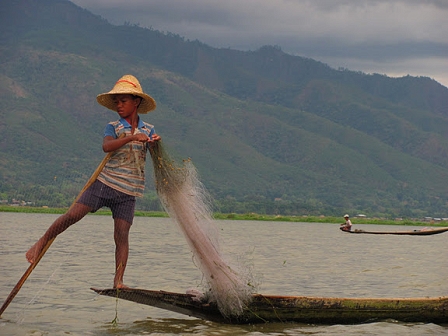
Johnny Bliss, 2011
* - Actually I didn't notice this; my friend Nina, who I was travelling with, did. But I thought it was an astute enough observation to be worth pocketing. This is also partly because the driving of motorbikes is banned (except for some police) in Rangoon, which contributes to a very restrained atmosphere.
One of the first things one notices* upon landing in Burma AKA Myanmar's capital Rangoon -well, other than the lack of bank machines and tourist infrastructure- is that it is a very reserved, quiet country, even when compared against other countries in South East Asia; outside of crowded markets, which are about the same everywhere, the locals tend to speak publicly in hushed tones. I should amend that by adding, this doesn't mean people will shy away from talking to you; they just won't do it very loudly, and they won't say very much in public.
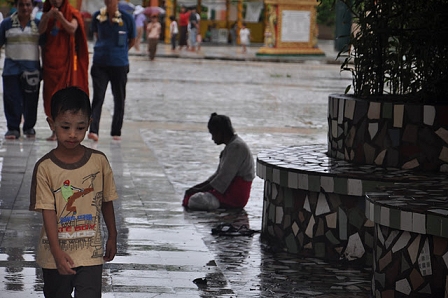
Nina Kribitz, 2011
Should, however, a friendly English-speaking local find you in a "safe" place, distant enough from the prospect of unwelcome eavesdroppers, you may very well find yourself getting an earful, whether they're concerned with the rising price of petrol, or not being able to take care of a sick aunt.
This isn't to say that the people are aggressive either. Both my friend and I were surprised by the genuine warmth and friendliness that became a defining feature of nearly every encounter we had with the monks, rickshaw drivers, and random locals we met on the street.
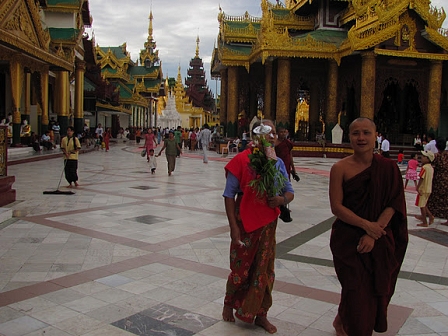
Johnny Bliss, 2011
* - Bangkok is, as far as I know, the best and easiest location to get a tourist visa to enter Burma. Although we still had to go through a special agency, and go through a thorough vetting process (including an interview with an agent in Bangkok) before receiving our visas, the entire process was over within three days. The embassy at Bangkok has a reputation of being far more reliable than at other Burmese embassies around the world.
Not surprisingly, most locals were as reticent to be interviewed as I was, to actually conduct the interviews. In a country like Burma-Myanmar, this has an easy explanation: the stakes are very high, on both sides. To even get into the country, I had to pretend to be a German student. While I was able to bring a video camera into the country, the ordinary microphone was too conspicuous, and got left behind in Bangkok.*
On my side, there was the risk of getting arrested for violating the nation's strict censorship laws - and then receiving a hefty sentence of up to 15 years. According to the Committee to Protect Journalists (CPJ), Burma "has a long record of jailing independent journalists, ranking among the world’s five worst jailers of the press for four consecutive years."
For local people, the risk was even greater. I've read reports of Burmese people receiving harsh sentences of nearly a hundred years for "public order offense"-related infractions.
Still, every rule has its exceptions, and even in Burma, I found some people who were keen to be interviewed and filmed.
The Moustache Brothers of Mandalay
The children and grandchildren of a long line of comedians, the three brothers Lu Zao, Lu Mao, and Par Par Lay have certainly faced their fair share of hardship. From 1996 to 2001, Lay and Zao spent nearly six years in prison after performing for an enthusiastic crowd, at pro-Democracy opposition leader Aung San Suu Kyi's home in Rangoon. Lay was again arrested in 2007 for just over a month, before being again released.
Now, under house arrest, the brothers perform a low-fidelity comedy and anyeint dance set for small groups of tourists in English. The government tolerates these limited English performances, although they do still sometimes show up after midnight to harrass the comedians.
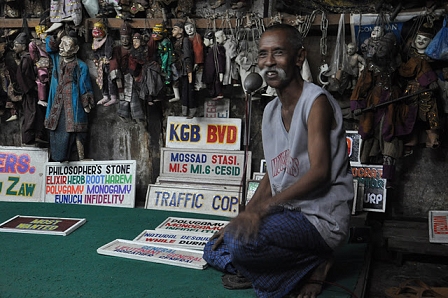
Nina Kribitz, 2011
"During the performance, [the secret police] don't come," Lu Mao explains. "If they want to arrest [us], only midnight. Tourists gone, midnight they come. No morning, no day, no evening."
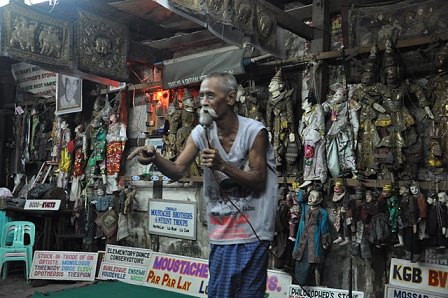
Nina Kribitz, 2011
While the brothers manage to maintain a smile and a good energy throughout the performance, it is a bit sad to see the state they are reduced to - once massively popular, their comedy routine is now limited to physical comedy (a la the Marx Brothers) and the few jokes Lu Mao can tell in broken English: the other two brothers speak little to no English.
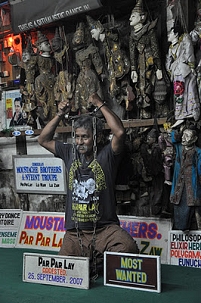
Nina Kribitz, 2011
I asked Lu Mao what he thinks of recent changes in the government policy.
It should be noted that this interview took place some months ago, before a lot of recent developments took place, including a meeting between the government and opposition leader prisoner Aung San Suu Kyi, as well as the amnesty of several hundred prisoners.
Do you think things are changing slowly in Burma? Is the country heading toward a better future?
"You see here," said Lu Mao, pointing at an empty bottle of Tiger Beer.
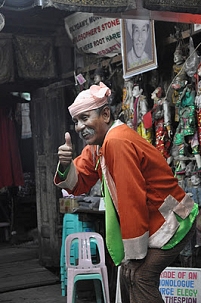
Nina Kribitz, 2011
"Tomorrow I will show you this beer, [but] I'll take off the label, and I'll stick on a new label: Johnny Walker Black."
With a bitter laugh, he continued, "After a week, I'll take off that label, and put a new one, and you'll see: Cognac. We [have a saying] in Burma: new bottle, old wine."
I hope that won't always be true, but naturally the brothers have more perspective here than I do.
To gain another perspective, I also met with a much younger activist monk during my time in Rangoon.
A bit more optimistic about the country's prospects than the Moustache Brothers, he nevertheless requested that his identity be kept anonymous.
Anonymous Monk
"I have been a monk for fourteen years. I was living in a very small village where there is no electricity, no transportation, no clinic, and when I was there in the village, I [was] not able to go to school. It was very expensive for me. But [as a monk], I could go to school.
"I became a novice when I was eight years; at 19 I decided to be a monk. If you are an ordinary person, you have to worry about the food, about the clothes. I eat what the people donate, and I can do a lot of social work. I don't need to worry about the food, or the girlfriend, or the family."
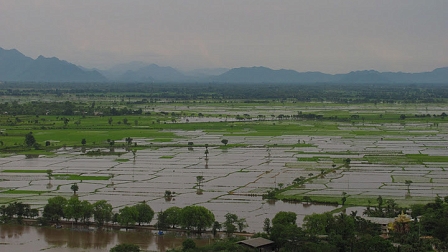
Johnny Bliss, 2011
When he says social work, he is not kidding. In the four years since he made the decision to remain a monk, he has established four free monastery schools around the country, and brought electricity and sewage systems to his home village.
Can you tell me a little bit about how that came to pass? Because you didn't just flick your fingers and a school appeared, you had to do a lot of groundwork I guess.
"Yes, you know... for a monastery education school, the biggest problem is the teacher salary. Sometimes we cannot pay the teacher salary, but our teachers are patient, and they tolerate even they don't got money from us. When we get donation, we give them salary. When we don't, we don't."
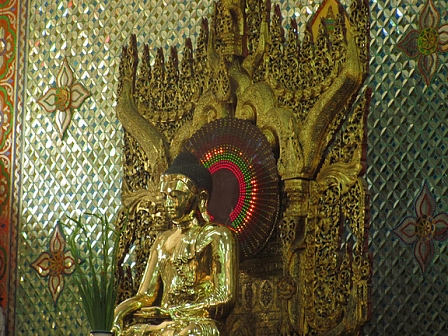
Johnny Bliss, 2011
And what do you teach?
"We teach [the kids] physics, chemistry, biology, mathematics, english, economics, history, and critical thinking. As you know, critical thinking is very important for the children and the country, because in the class we [would] listen to what the teacher said, [but there was] no debate class and no discussion class, so when we [would] meet our girlfriends, we don't have a question, because we didn't learn critical thinking."
Why are the monastery schools so important?
"In Myanmar, every student cannot go to the government school, because of two reasons. One first reason is, we are far away from the government school, [and the] second reason is, it is really expensive. So monastery education schools are really necessary for the country."
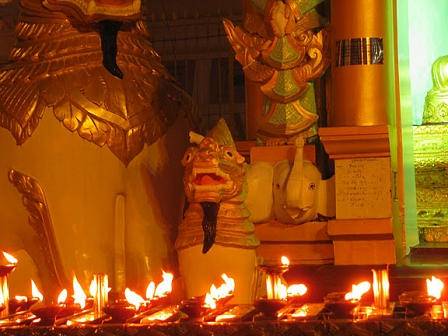
Johnny Bliss, 2011
Can you tell me a little bit about what a day in your life is like? When you get up, etc.
"Normally I get up at about 3 o'clock in the night time... I get up very early, because in Burma, the daytime [internet] connection is not really good, very bad, you know. Sometimes we have the feeling when we use the internet, they say access denied - and [we have to] try again. So we have to wait until 2 o'clock, we use [the internet until] 3 in the morning, and then from morning, before 9 o'clock, we go to collect food. Then we come back at 9 o'clock, to teach the poor children English or [other] training. And then we take a shower and have lunch, and then we have to do a lot of things, until 10 o'clock in the night. Lots of things to do."
Not much time to meditate.
"Not too much time to meditate, no. Every evening, about six o'clock we take a meditation for about twenty minutes or thirty minutes."
So you get up at 2 in the morning and you work until ten.
"Yes."
Are you Super Monk? Or don't you ever get really tired?
"Yes, we do really tire. Sometimes we take a nap in the daytime."
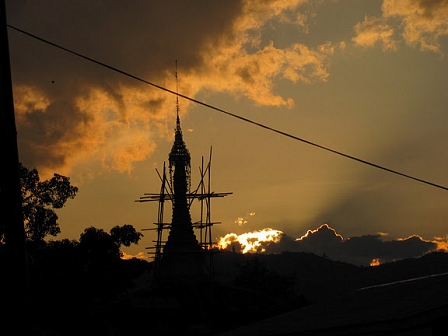
Johnny Bliss, 2011
Can you tell me something about your personal Buddhist beliefs?
"For the religion, I like to suggest to learn clearly everything and not to believe a word the teacher said, and not to believe the heresy. Also from the old text, don't believe: you have to learn it yourself when you know yourself."
Which is why you say critical thinking is important. Like it's actually a big part of your religious belief.
"Religion, yes, yes. You know, in Buddhism, understanding is really important. For example, a student who makes mathematics: if he does not understand it by himself clearly, he cannot calculate by himself, no brother. So also for liberation, you must understand very clearly yourself."
Lastly you've done quite a few projects in your time as a monk. In the last seven years you've done quite a lot. What sort of ambitions do you have for the coming years?
"I have two ambitions. One, if I do go back to normal life, I want to become [the] Burmese new president. Second, I want to be a monk the rest of my life, to make a bigger project for Burma. That's all."
Buddhist Nation
When we think about Burma in the west, we often tend to focus our attention on the totalitarian regime, and it is often easy to forget that there is also an extremely diverse and spiritual country in there, composing of over 135 groups and over 100 different languages.
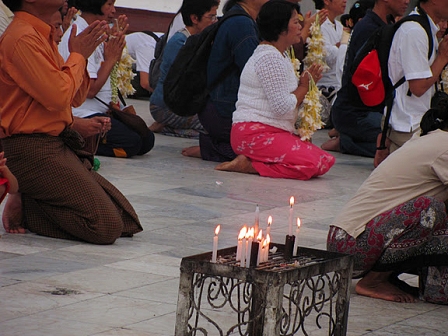
Johnny Bliss, 2011
The idea of critical thinking being a part of religious ideology, was revolutionary to me. So were some of the ways they'd thought up to make money for the monasteries. Below, you will see a game where locals throw money into an automated moving Buddha. The kind of machine you would see in Vienna's Prater Amusement Park, but with a Buddhist twist.
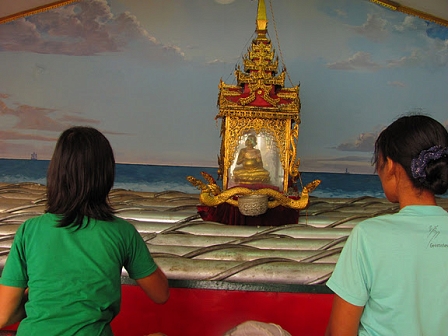
Johnny Bliss, 2011
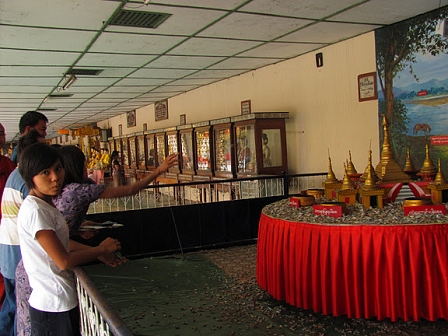
Johnny Bliss, 2011
In Rangoon, there is a massive golden temple in the center - literally a whole area of the city in gold. This is the SHWE DA GON pagoda, and it really sort of puts Innsbruck's golden roof to shame.
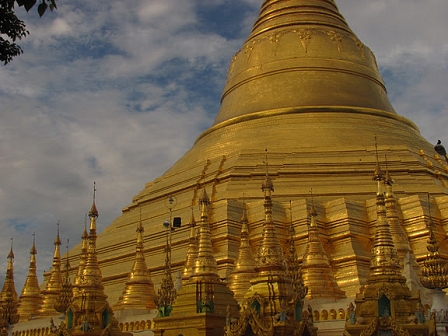
Johnny Bliss, 2011
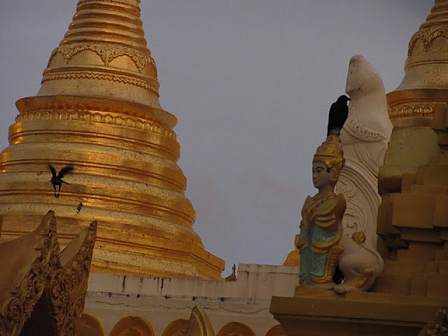
Johnny Bliss, 2011
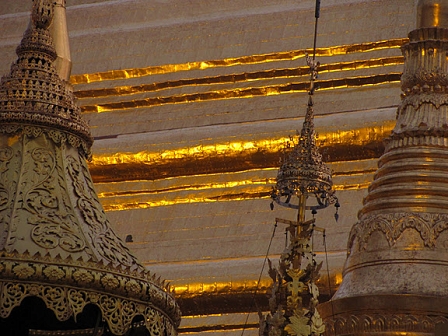
Johnny Bliss, 2011
There is so much of the country I was not even able to visit, because of restrictions on foreign tourists, but I do hope that the day comes when this mysterious and beautiful country opens up, for both our benefit, and for the benefit of the locals themselves.
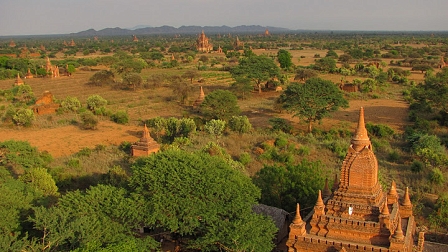
Johnny Bliss, 2011
Special thanks goes to Nina for the idea to come to Myanmar the first time, as well as to the Moustache Brothers and our anonymous monk.
--
Here is my exclusive video interview with the Moustache Brothers:


